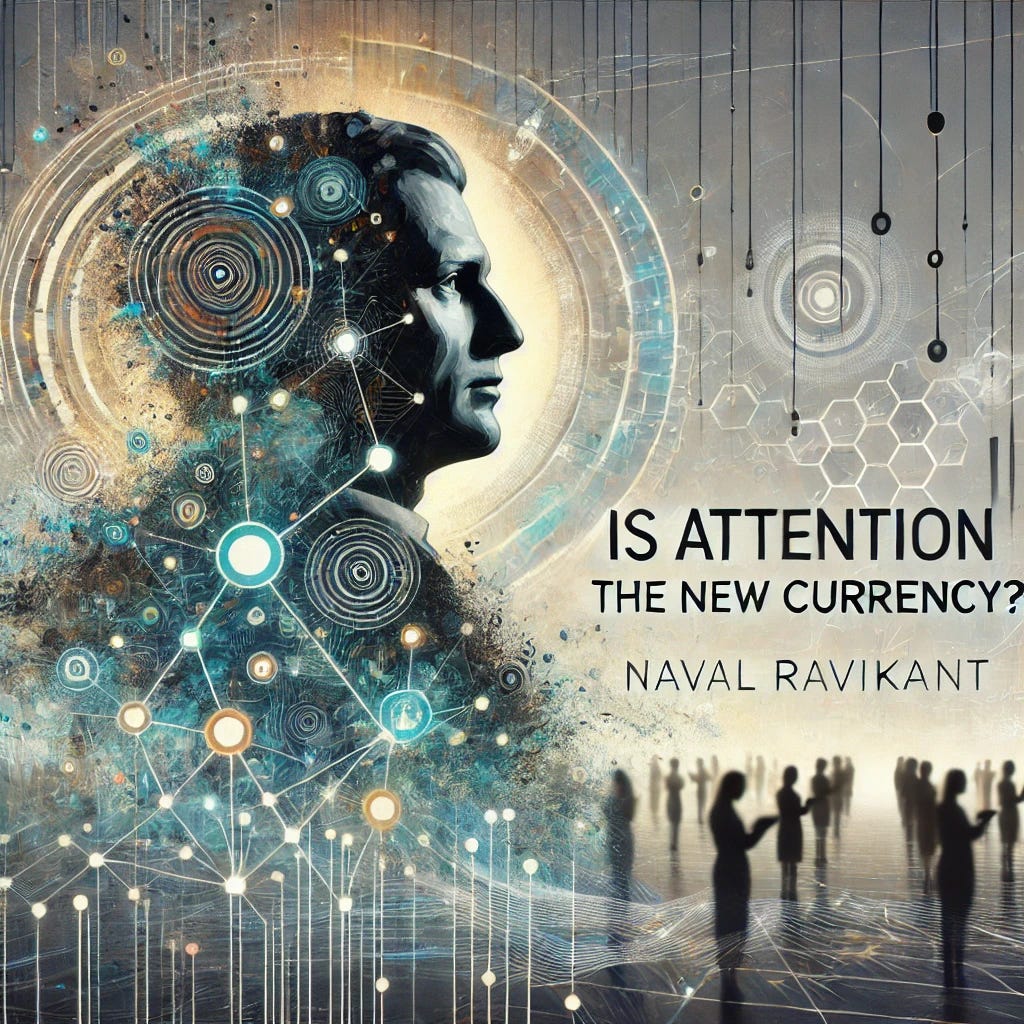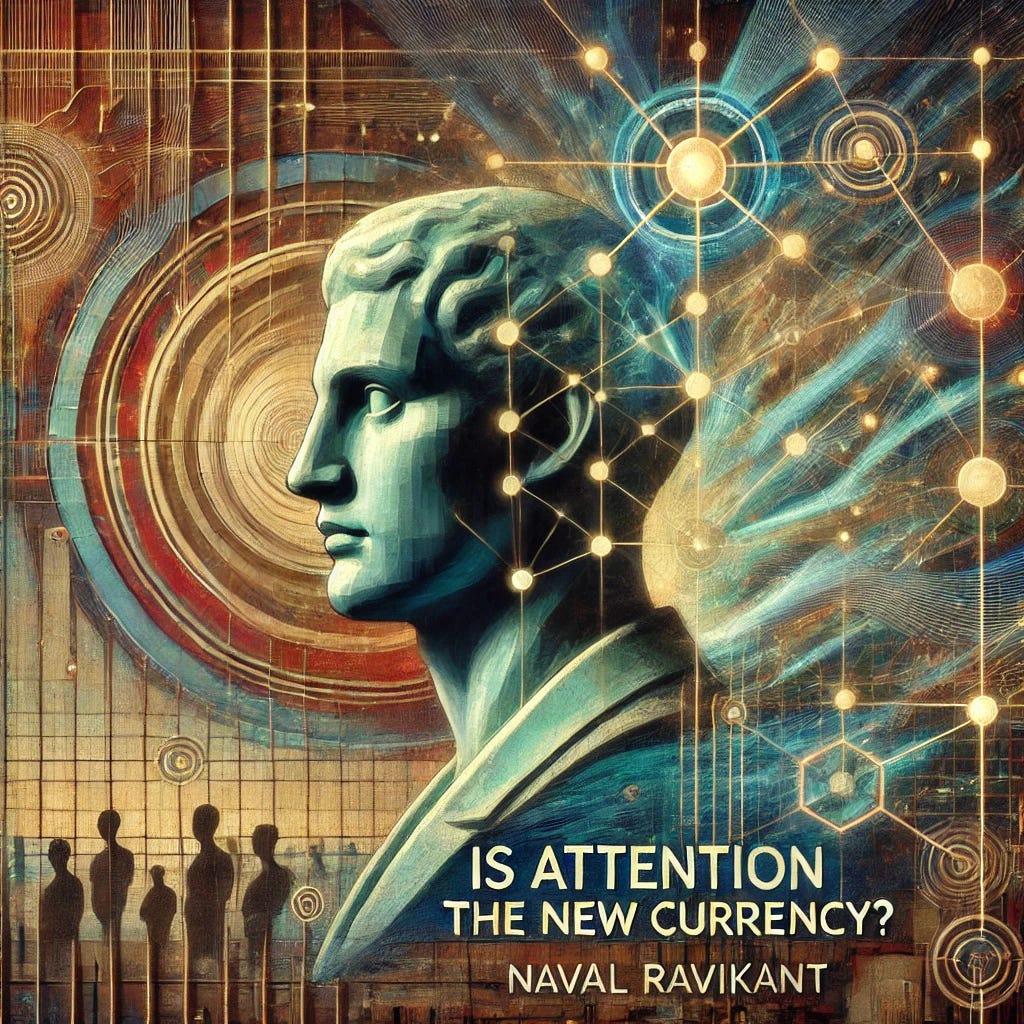"Is Attention the New Currency?" Exploring Naval Ravikant's Vision and My Perspective
How scarcity and quality of attention and the emergence of the "Network State" are reshaping influence, sovereignty, and the future of society.
How Attention is Becoming the Most Valuable Resource
Naval Ravikant, the influential entrepreneur and investor, is known for his pithy yet deeply insightful observations. In one such thought-provoking tweet, he remarked: "The true scarcity is attention, not time." This statement quickly resonated with many, highlighting a fundamental shift in how we perceive value in today’s world of information overload. As attention becomes harder to capture, it has emerged as one of the most valuable resources in the digital economy.
My Response to Naval: Attention as the Ultimate Currency
In response to Naval’s tweet, I noted, "Attention is the ultimate currency, which governments cannot print—hence it will not suffer from inflation, only growth." This succinctly captures the essence of attention in our era—its scarcity fuels its value. Unlike traditional currencies, attention cannot be artificially inflated, and its significance grows organically. This makes attention a powerful factor in shaping perceptions, driving decisions, and influencing conversations across the globe.
I further accentuated, "The attention of an influential person is far more valuable." In today’s hyper-connected environment, attention is not just limited, but selective, making it a critical resource that determines the success or failure of individuals, brands, and movements.
Attention as the New Currency
Attention is increasingly functioning as a currency that stands apart from traditional monetary systems. Its value depends on the quality and influence of the person commanding it. In a digital age where visibility is everything, capturing the attention of influential figures can yield far greater results than engaging with the masses, or the “fool multitude”, as the Bard would have described it. The scarcity of meaningful attention gives it immense value, and those who can harness and direct it hold considerable power in shaping the future.
Who is Naval Ravikant?
Naval Ravikant is a highly respected figure in the tech and startup ecosystem, renowned for his sharp insights on technology, wealth creation, and personal development. Born in India and now a U.S. citizen, he turns 50 in November. As the co-founder, chairman, and former CEO of AngelList—a platform that connects startups with angel investors—Naval has been instrumental in driving innovation and entrepreneurship. His career also includes founding Epinions, a pioneering consumer review site, and investing in major companies such as Uber, Twitter, and Stack Overflow.
Naval's concise yet impactful commentary, especially on platforms like Twitter, has earned him a vast following of tech enthusiasts, entrepreneurs, and investors. His ability to distil complex ideas into digestible wisdom has made him a respected voice in conversations about the future of technology and wealth.
Quality Over Quantity: The True Power of Influence
In the digital world, not all attention is created equal. The focus of a key figure like Naval Ravikant carries far more weight than the fleeting attention of an average social media user. It's not about how many people are paying attention, but who is paying attention. The attention of a respected or influential individual can magnify an idea’s impact, leading to disproportionate outcomes—sometimes sparking a movement that reshapes entire industries. This highlights the importance of quality over quantity in today’s attention economy.
Action and Eloquence: Turning Attention into Influence
As Shakespeare famously said, "Action is eloquence." The true power of attention lies in the actions it inspires. A single endorsement, retweet, or business decision by an influential figure can create a ripple effect, amplifying attention and influence. This cascade of attention leads to tangible results, illustrating that in today’s world, the ability to capture and direct attention toward meaningful action is one of the most valuable skills anyone can possess.
The Attention Economy: Competing for Focus
In today’s "attention economy," businesses and individuals are in constant competition for focus. Social media platforms, content creators, and brands all strive to capture the limited attention spans of their audiences. The digital landscape is flooded with information—along with misinformation and disinformation—making it increasingly challenging to break through the omnipresent “white” noise. Success now hinges on understanding the dynamics of attention—how to capture, sustain, and ultimately leverage it for lasting influence and growth.
Introducing the Network State: A New Dimension of Sovereignty
Naval Ravikant’s ideas extend beyond the attention economy, touching on broader societal and political concepts. One such concept is Balaji Srinivasan's "Network State," which redefines traditional notions of sovereignty. The Network State is not confined by geographic borders but by the collective attention and alignment of a dispersed, yet connected, group of individuals.
This new model of sovereignty relies on the ability of these communities to synchronise their efforts and amplify their shared goals through network effects. Small inputs from a unified, attention-focused group can produce disproportionate impacts, creating resonance that magnifies their influence. The Network State challenges the conventional nation-state model by demonstrating that a group’s capacity to command and direct attention can serve as a form of soft power, influencing global discourse and policy.
Sovereignty of Attention: A Paradigm Shift
The Network State represents a paradigm where sovereignty is not solely defined by physical borders but also by the collective attention and beliefs of a global community. This shift in understanding power and influence is a natural progression in an era where attention is becoming the new currency. Communities that can command and sustain attention wield new forms of social and political capital, reshaping the future of governance and societal organisation.
Summing Up: Navigating the Attention Economy
Naval Ravikant’s emphasis on the scarcity of attention invites us to reconsider how we allocate our focus and how we define value in the modern world. In this evolving attention economy, success is no longer measured by time or effort alone but by the quality and impact of the attention we both command and give. As we move toward more decentralised, network-driven models of influence, mastering the dynamics of attention will be essential for individuals, businesses, and communities alike.
The rise of the Network State, combined with the increasing significance of attention, marks a shift toward a future where collective focus and resonance can transform small efforts into world-changing events. Those who can skillfully harness and leverage attention will be at the forefront of shaping society's direction.
In this context, I am pleased to note that my humble newsletter, The KBS Chronicle, though modest in its 3,000+ “influential” subscriber base, enjoys a healthy "open-rate" and is read daily in over 17 countries, with 30% of its readership coming from outside India. Among the daily readers are not just subscribers but also individuals who access the articles via Google Alerts, Telegram, and WhatsApp groups, thanks to the efforts of some dedicated supporters. As I often say, it’s all about quality over quantity. And to echo, perhaps predictably, in the words of William Shakespeare: "I can no other answer make but thanks, and thanks, and ever thanks."
Citations:
[1] The Impact of Influencers on Social Media for Businesses
[2] Study on Attention and Focus
[3] Research on Attention in Digital Media
[4] Naval Ravikant's Top Tweets on Technology
[5] Imagining Attention as a Currency
[6] Naval Ravikant's Quotes Compilation
[7] Naval Ravikant's Insights on Life and Wealth
[8] Naval Ravikant's Wikipedia Entry
[9] Overview of The Network State
[10] Balaji Srinivasan's Network State Concept
[11] The Network State Book by Balaji Srinivasan




ਵਿਸੇ਼ ਸਬੰਧੀ ਆਪ ਜੀ ਦੇ ਵਿਚਾਰ ਬਹੁਤ ਵਡਮੁੱਲੇ ਅਤੇ ਸਹੀ ਹਨ । ਪੈਸਾ ਕਮਾਉਣ ਲਈ ਮਨੁੱਖ ਜਿੰਨੇਂ ਸਿੱਧੇ ਅਤੇ ਅਸਿੱਧੇ ਕੰਮ ਕਰਦਾ ਹੈ ਅਤੇ ਜਿੰਨਾ ਸਮਾਂ ਦਿੰਦਾ ਹੈ ਅਤੇ ਚਿੰਤਾ ਕਰਦਾ ਹੈ ਕਿਤੇ ਅਕਲ ਅਤੇ ਸਹਿਜ ਦਾ ਆਸਰਾ ਲੈ ਕੇ ਆਪਣੇ ਮਨ ਦੀ ਸਹਿਜਤਾ ਨੂੰ ਡੋਲਣ ਨਾਂ ਦੇਵੇ ਤਾਂ ਪ੍ਰਾਪਤੀਆਂ ਦਾ ਪੱਧਰ ਬਹੁਤ ਉੱਚਾ ਹੋ ਸਕਦਾ ਹੈ।
ਅਕਲੀ ਸਾਹਿਬੁ ਸੇਵੀਐ ਅਕਲੀ ਪਾਈਐ ਮਾਨੁ